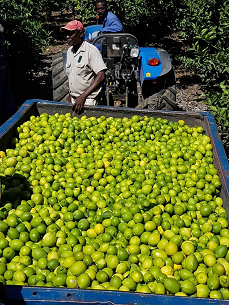 Just over 3.6 million 15kg cartons lemons have been exported thus far in the lemon season, of which two-thirds have gone to the Middle East, traditionally one of the early markets for South African lemons.
Just over 3.6 million 15kg cartons lemons have been exported thus far in the lemon season, of which two-thirds have gone to the Middle East, traditionally one of the early markets for South African lemons.
Lemons started early, the earliest start ever for some producers, and by week 15 exports are about double of where they stood by this time during the last two years.
Most lemons are heading for the Middle East due to current size distribution, which tends towards a small size, as well as a reduction in trade with Hong Kong and the Far East.
Russia has taken a bit more than last year (making up 13% of total lemon exports), but some traders have reported difficulty in procuring the requisite large sizes for that market.
There is also a difference regarding exports to Europe, which took 28% of total exports this time last year, but thus far taking only 5% of South Africa's lemons, as Turkey ends its lemon season and Spain switches to Vernas.
There is strong demand for lemons in response to the epidemic, but all things being equal, a significant rise in lemon exports was to be expected. A 20% leap in lemon exports has been forecast for this season; for the region including Zimbabwe and Swaziland an estimated 26.4 million 15kg cartons (396,000 tonnes).
Exports picked up steam a month ago when it reached weekly shipments only attained in May last year.
"Lemons (and Satsumas) are pouring through the door," quips an Eastern Cape trader.

